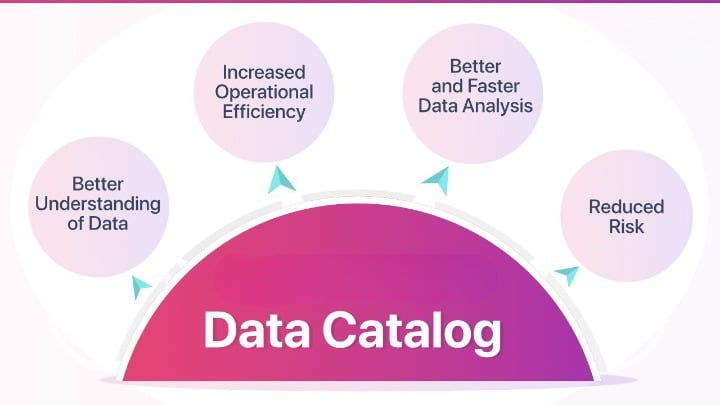Data Catalogs are becoming increasingly important in the modern world, and their importance will only continue to grow in the future. A Data Catalog is an organized inventory of data assets within an organization, and it uses metadata to help organizations manage their data more effectively. Data Catalogs provide data professionals with the ability to collect, organize, access, and enrich their metadata, enabling them to better support data discovery and governance. As data becomes increasingly valuable and more important in the future, Data Catalogs will become a key tool for businesses to utilize in order to gain the most out of their data assets.
Data Management:
Data management is an essential part of any modern organization, and data catalogs are becoming increasingly important in the digital age. A data catalog is a central repository that stores information about data assets, including their locations, owners, users, and purposes. Data catalogs help to ensure that all relevant data can be found easily and quickly, making it easier to manage the data lifecycle.
Data catalogs can also help organizations control access to their data, which is important for data governance. For example, Azure Data Catalog enables organizations to register and classify their data, giving them more control over who has access to it.
Data catalogs also provide a way for organizations to keep track of their data assets, as well as to find relevant data for projects. For example, data catalog companies such as Alation offer catalogs with integrated search capabilities that allow users to quickly locate and explore data sets across their organization. Additionally, many data catalog tools allow users to visualize and share data assets, such as through interactive charts and dashboards. This can help organizations gain insights into their data and make more informed decisions.
In short, data catalogs are an essential tool for data management. By enabling organizations to easily store and find data, they can make it simpler to use data effectively and efficiently. From controlling access to improving data quality, data catalogs are becoming an increasingly important part of the modern organization.
Data Discovery:
Data discovery is an important aspect of managing data within an organization. It involves searching, analyzing, and understanding data in order to gain insights and support decision-making. A data catalog can be a powerful tool for enabling data discovery. By leveraging the metadata stored in the data catalog, organizations can quickly search for and locate relevant data assets. For example, Azure Data Catalog is a cloud-based data catalog that allows users to quickly search and browse through their catalog of data assets.
Data catalogs also provide organizations with a comprehensive view of their data assets, allowing users to access the latest version of any asset. This can be especially useful in large organizations with numerous databases, as it simplifies the process of finding the most up-to-date version of a particular asset. Additionally, there are a number of data catalog tools and companies that provide comprehensive solutions for data discovery, such as Alation and Collibra. These solutions make it easier for organizations to store, manage, and discover their data assets.
Data Governance:
Data governance is an essential part of a successful data strategy. It involves organizing and governing the data to ensure accuracy, consistency, and quality of data across the organization. Data governance is essential for any organization looking to make meaningful decisions with its data.
A data catalog is a key tool used in data governance. A data catalog is an inventory of data assets, with metadata to help organizations manage their data. It allows organizations to access and enrich metadata, so they can locate the right data quickly and use it to make better decisions. Microsoft Azure Data Catalog is one example of a widespread data catalog platform. It allows users to find and understand their data sources, provides context for data, and collaborates with others on discovering and consuming data.
There are also several other data catalog tools available from various companies. Waterline Data provides automated data discovery and classification services, while IBM InfoSphere Master Data Management supports the governance of master data across the enterprise. There are also many other companies that offer their own custom data catalog solutions.
No matter which type of data catalog solution you choose, it should be integrated into your overall data governance strategy. When properly implemented, a data catalog can help you increase the accuracy, consistency, and quality of your organization’s data, while allowing users to easily access the right data to make informed decisions.
Improving Data Quality:
Data Quality is an essential factor for organizations looking to succeed in the modern world. Poor quality data can lead to bad decisions, costly mistakes, and loss of business. With the right tools and processes, organizations can ensure that the data they are using is accurate and up-to-date. Data catalogs are one such tool that helps organizations improve their data quality.
Data catalogs provide a way to keep track of all the data assets within an organization, as well as the associated metadata. This helps ensure that data is properly documented and organized, and allows easy access when needed. By having a data catalog, organizations can quickly identify potential errors or discrepancies in their data.
For example, Azure Data Catalog provides a range of features for helping organizations improve their data quality. It allows organizations to create comprehensive catalogs of their data assets and associated metadata, as well as create custom tags to make it easier to find related information. It also allows organizations to apply policies and rules to their data to ensure its accuracy and completeness.
Other data catalog tools, such as those provided by leading data catalog companies like Alation and Collibra, offer similar features. They allow users to easily search and explore datasets, as well as apply rules and policies to ensure data accuracy.
By utilizing a data catalog, organizations can significantly improve their data quality. Having an organized inventory of their data assets makes it easier to identify potential issues with their data, allowing them to take quick action to resolve them. In addition, applying rules and policies through a data catalog helps organizations ensure that their data is accurate and up-to-date. Ultimately, this leads to better decision-making and improved overall business performance.




Leave a Reply